By Martin Grunburg:
Warning! Before you read this it’s highly recommended that you read the prior post to understand the context of this post and why it was written.
In the prior post, I recounted a discussion with a lawyer about the critical importance of understanding WHY he (and his firm) provides a superior solution/option for any potential client who may be shopping for his services.
At the same time, I could completely relate to his unwillingness to boast about his work or his firm’s accomplishments. His thinking was along the lines of, “Well, if they choose me great; if they don’t, that is great too.”
Unfortunately, I explained to him (as I’ve begun to recognize lately), that such an attitude of humility (an unwillingness to be proud of his accomplishments) was actually doing his clients, his family and himself a huge disservice.
Even if it was against his nature, he had to find a way to “boast” about his accomplishments and that of his company, if only to help differentiate his business/solutions for his prospects. After our conversation, I asked him to list 10 great reasons why he and his firm are superior. After sharing this experience in my last post, it occurred to me that I should give myself the same homework.
It turns out, with a little prodding I not only have 10, but actually 13 (and probably even more) reasons why the Habit Factor is the best goal achievement methodology around. Hold me back! ; )
So, here we go:
- The Habit Factor was the first Habits AND Goals app. In fact, when the app debuted in June of 2009, the most popular kind of app in the iTunes Productivity marketplace was the To-Do app. The Habit Factor, though, was the first to introduce the concept that habit is the most crucial path to goal achievement, superseding and at the same time complementing the S.M.A.R.T. Goals methodology as a practice to achieving your goals more quickly. And, all this was explained in the …
- Bestselling book: The Habit Factor is the only habit app complemented by a best-selling personal development book. True story: The book was in the works well before the app, germinating with early writings as far back as 2003. However, the book wasn’t an earnest project until 2008, and that is when the iPhone and, equally important, the iTunes App Store was introduced. My entrepreneur group encouraged me to stop writing the book and to develop an app ASAP (which I did), and then I returned to finish the book, which was published in November, 2010.
- P.A.R.R. Methodology: The Habit Factor employees the Plan, Act, Record and Reassess methodology for habit development. This is far superior to Cue, Routine, Reward (the 3 R’s of Habit development) and even B-MAT ideas/processes taught elsewhere. All of these are “backward” facing and do NOT involve tracking and tracking periods. The “funny” thing: Nearly all the other habit apps that have entered the marketplace have at least partially copied The Habit Factor process — Planning, Acting, Recording. Nearly all these apps employ “Target Days” and “Minimum Success Criteria.” But, what they don’t have — and seem to not understand — is the idea of the…
- “Tracking Period”: This is entirely unique to The Habit Factor process, which recommends an ideal tracking period of 4 weeks. However, some people use longer periods while some use periods as short as one week. By using P.A.R.R. and employing the tracking period feature, the user may incrementally increase the frequencies per week and even the minimum success criteria (20 push-ups or 45 push-ups) — another totally unique feature to The Habit Factor called,
- HabitStrength™: Habit strength as a concept was introduced by Clark Hull, Ph.D., and while it was a seemingly overly complex formula, the base premise was that habit (like a muscle) increases with use over time and is NOT dependent upon consecutive days (as so many of these “habits” courses that are popping up now teach). Watch this video about how the PARR methodology and HabitStrength work together. Again, the key point is that tracking periods and reassessment are what make this possible!
- The Law of Cosmic Habit Force: This (see post) is the great secret and missing ingredient that was never in the classic self-help bestseller, Think and Grow Rich — these are not my words, but those of Napoleon Hill, the author who, after spending 20 years writing the classic bestseller, recognized that “something was missing.” He went back to the drawing board and (again, in his words) identified the missing ingredient after another 20 years. Yes, that is 40 years total to come up with his 17th principle in his Science of Personal Achievement (Amazon, one of my favorite programs). It’s very rare to find anyone who’s listened to it, and rarer still to find anyone who’s listened to it as many times as I have. You can find the program on Audible.com here (with that link you can get it FREE; just click on the ‘Get my free book’ and search “The Science of Personal Achievement.” What I’m saying here is The Habit Factor is, in many ways, The Law of Cosmic Habit Force. It picks up where Mr. Hill left off and helps to explain in clear and practical, easy to understand terms what Mr. Hill never got to fully share — by that time he formulated these theories he was in his 70s. The Habit Factor goes a bit further, though, with the correlation of habit development and tracking as a process to achieve goals. (The sound bites — Napoleon Hill’s own words are in the above referenced post.)
- Success Stories: The Habit Factor has proven time and again with countless success stories/case studies that applying this process works and, here’s the best part, it works every time — when the user works every time. Whether it’s a marathon or writing a book or getting fit, applying The Habit Factor process creates fantastic results. See this and this (links to a few pretty cool success stories!).
- Certified Professionals Program: While any coach and professional is free to teach these ideas and share them (and they do), only The Habit Factor has established a Certified Professionals Program specifically for how professionals can best employ the ideas in the book and the app to get the best results with your clients and patients.
- Podcast: The Habit Factor is now a triple threat : ): book, app and now podcast. The podcast in its second season — just re-launched and off to an amazing start with 3 weekly episodes: Monday (Mind Bullet Monday), Wednesday (interviews), and Friday (Frequently Asked Fridays). Listeners have reported higher levels of motivation and engagement by augmenting their app usage and book lessons with the podcast discussions, interviews and ongoing ideas.
- MG: That’d be me. (You should have seen this one coming). I tell you it’s been a bit tough to write this, and it’s encouraging at the same time. It makes me feel really good that there is so much value in not just the ideas (as a foundation), but in the practical use of this process and methodology. I list me as a positive, I guess, since while some of the app’s content is copied, what can’t be copied (at this point anyway) is me — the man behind the book and app. There is no doubt I’m immeasurably grateful to all those who’ve come before me and paved the way with their great insights and ideologies around personal development. It was their fundamental groundwork that spurred me to research and study and write about HABIT. The Habit Factor, while taking a significant leap forward, I’m sure, synthesized many of the all-time industry greats and many of their ideas: Hill, Rohn, Covey, Robbins, Tracy, Dyer, etc., to name a few. BTW: If you’re a fan of the book StrengthFinders, here are my Top 5 strengths according to its comprehensive survey: Strategic, Relator, Achiever, Futurist, Positivity. (I’m not sure about the order, but sounds about right.)
- My Mission with THF: This is the scary thing, and I’ll just throw this out there. It was rare, VERY rare, to find any book (ebook or otherwise) on HABIT as the sole subject back in 2010. Today it’s commonplace. My mission was simply this: To alter the negative association of habit and help people to understand it’s the greatest (built-in) tool we all have to achieve our goals. The idea that habit is most often regarded as negative is nearly tragic, and I undertook the writing of the book to help spark that awareness — in fact, it’s the same awareness William James lectured about at Harvard in his now famous “Talks to Teachers” in the late 1800s compelling teachers to understand what HABIT truly is:
It is very important that teachers should realize the importance of habit, and psychology helps us greatly at this point. We speak, it is true, of good habits and of bad habits; but, when people use the word ‘habit,’ in the majority of instances it is a bad habit which they have in mind. They talk of the smoking-habit and the swearing-habit and the drinking-habit, but not of the abstention-habit or the moderation-habit or the courage-habit. But the fact is that our virtues are habits as much as our vices. All our life, so far as it has definite form, is but a mass of habits,—practical, emotional, and intellectual,—systematically organized for our weal or woe, and bearing us irresistibly toward our destiny, whatever the latter may be.
- Not sure it qualifies as a very good reason why The Habit Factor is better, but it’s kind of funny and I’ll let you decide. The Habit Factor introduced this idea/concept of the infinity symbol as a representative symbol for habit.

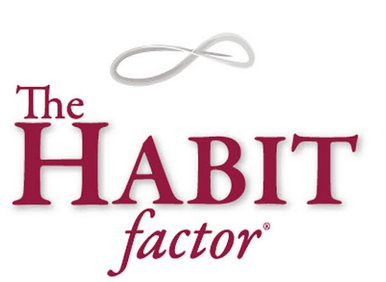
I thought the concept of an infinity symbol to represent habit was powerful. Particularly if I broke the symbol slightly to introduce the idea/concept that a habit could break down if not reinforced or, maybe more importantly, symbolically demonstrate to those trying to break bad habits that it was possible. Shortly, and not so shortly, following The Habit Factor, here are some of the other apps’ representative logos…
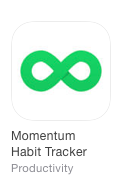
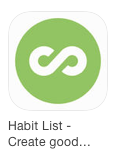
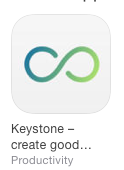
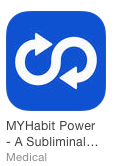
- Unsolicited Praise: While many competing apps/companies are experts at getting press and coverage to help promote their habit app, The Habit Factor has flourished with priceless unsolicited coverage in prominent online publications including The New York Times, C|Net, Lifehacker.com, and Mashable.com, not to mention the countless other productivity blogs (sample here).
So why spend all this time talking about The Habit Factor? Well, in the spirit of this post… it can be a HUGE difference maker (Free tracking template), and as I explained to my lawyer friend, if WE can’t recount the important distinctions about our products/services, chances are good our clients/users won’t be able to either. And, here’s the best reason this process (and app) is all readily available to you. Apparently, it’s my job to make sure you know about THF and WHY The Habit Factor is the best value/solution available when it comes to building new, positive habits and breaking bad ones. Hence, the extended list.
Final thoughts related to #11 above: Regarding the creation of a movement recognizing habit as a force for good and specifically for goal achievement, it’s important to recognize that even the great work of Dr. Stephen Covey and The 7 Habits of Highly Effective People was not just a book about (solely) HABIT. That book was specifically about 7 Habits, an important distinction because, as great as The 7 Habits of Highly Effective People is, it didn’t teach the reader about HABIT (as a craftable force for good), nor how to create habits, nor did it correlate habit as a process to achieve goals. A powerful and fantastic book nonetheless. And, it helps to prove that the message really isn’t just about 7 habits (no matter how great that book is), but rather, about HABIT. And, to be clear that’s not me saying this, it’s Dr. Covey himself who then went on to write The 8th Habit.
Even the uber-popular The Power of Habit, which came out about 16 months after The Habit Factor (to see a post and my thoughts on that book, click here), also failed to correlate habit as a process to achieve goals and even provide a meaningful or specific methodology to create new habits. A great book with a few important shortcomings; 300 pages of anecdotes on the power of habit and approximately 11 pages in the appendix about how to apply them to modify behavior and create a new habit. Yes. The appendix. Long on supportive examples of the power of habit and short on how to apply the lessons with no practical-go-forward methodology, such as P.A.R.R.
So, there you have it my friends…this is why The Habit Factor is pretty good — OK, I’ll say it, it is the best — and now at least I can revert to the prior thinking shared by my lawyer friend. “If you select The Habit Factor, great. If not, well, I guess that is great too.”
Talk soon,
-mg
Btw: I hope you checkout our latest podcast interview w/ R. Michael Anderson about happiness, joy and the journey.